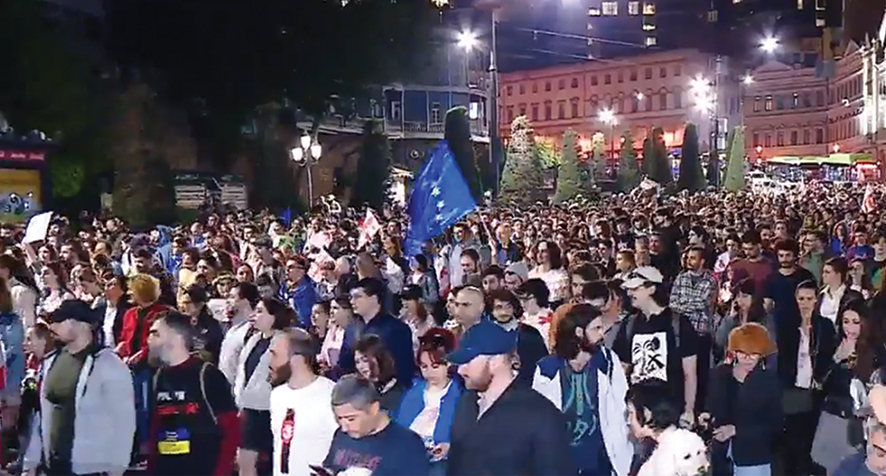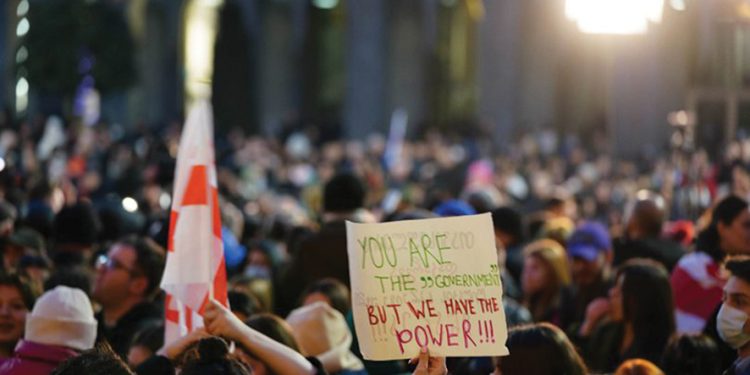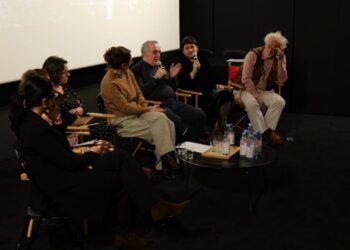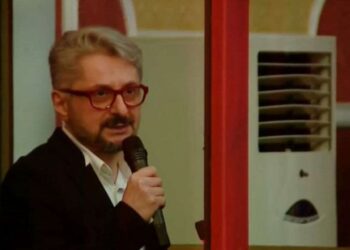After days of generally peaceful protest, in which around two dozen people were arrested, once the government had accepted the draft law “On transparency of foreign influence” with 83 votes in the first reading on April 17, the stage and speakers were taken down from in front of the parliament building. But if the MPs thought the protesters were done speaking out, were tired and resigned to their fates, they were wrong – for that night and every night since, the central avenue of the capital has been filled with Georgia’s youth. Sometimes they march along the streets, sometimes they dance the Georgian national dances, sometimes they open friendly games of football, and always they wave the Georgian and European flags and show off potent messages directed at the country’s decision makers and the eyes of Europe watching Georgia’s progress.
This week, the students also organized a march from Tbilisi State University to the Parliament and then to the Tiflis Palace hotel, where the participants of the rally claimed the Russian Institute was holding a forum on ‘Traditional Values.’
The student organizers say the protests will continue until the government withdraws the “On transparency of foreign influence” bill, but emphasized that they will aim not to go beyond the limits of freedom of expression, saying they hope that the police will pay the same respect in not trying to restrict them.
“Hopefully, there will be many of us. Our protest is spontaneous,” the organizers told press at Wednesday night’s protest. “Today, we saw a statement from the Ministry of Internal Affairs saying that it is forbidden to block the roadway, and we worry there is a risk of some kind of provocation in this.
“The protest did not start today and it will not end today. It is spontaneous, but peaceful and firm.”
The draft law “On transparency of foreign influence,” initiated for the second time by the Georgian Dream faction, envisages the registration of non-commercial legal entities and media outlets, whose income – more than 20% – is received from abroad, as an organization “carrying out the interests of a foreign power.” According to the project, everyone who is considered an “organization carrying the interests of a foreign power” must be registered in the public register under the same name in a mandatory manner. At the time of registration, it will be necessary to reflect the received income. At the same time, the organizations will have the obligation to fill in an annual financial declaration.

Questions abound as to what will happen on April 29, when Georgian Dream gathers its own supporters in front of Parliament. Part of the current protesters aim to respect the “others’” right to protest; some say there may be confrontations as emotions run high. It is also suspected that Georgian Dream will be bussing in its state-employees from across the country, of which there are over 100,000, leading to accusations of coercion. Indeed, such moves have been evidenced in past cases by both the current and previous governments of Georgia.
“Georgia must show its strength, that it supports transparency, nationalism, the ban on LGBT propaganda and the correct Georgian, strong national course,” Mamuka Mdinaradze, the leader of the parliamentary majority, said at the general meeting of the draft law prepared against LGBT propaganda this week, expressing hope that there will be support from the “whole of Georgia” in this direction.
“On April 29, we will count on your support and the whole of Georgia’s support in this,” Mdinaradze said.
At the end of March, two constitutional initiatives were registered: “Against LGBT Propaganda,” a draft of amendments to the current constitution, and a draft of the constitutional law entitled ” On Family Values and Protection of Minors.”
The constitutional initiative prepared “Against LGBT Propaganda ” was signed by 83 deputies of the majority. Article 30 of the Constitution will be amended, which concerns the rights of marriage, mothers and children. The draft constitutional law “On Family Values and Protection of Minors” consists of eight clauses and provides for the establishment of a number of restrictions and prohibitions.
“The basis for initiating this change is the trends we have all been observing recently. Trends that are happening in the world. Our experience shows us that the trends that are outside, after a certain period of time, can be transferred here. That’s why we have to establish our family values now,” said Chairman of the Parliament, Shalva Papuashvili, speaking at a general public review of the constitutional amendments against LGBT propaganda underway in Kutaisi Monday, a review which is also being held in Ambrolauri, Ozurgeti, Batumi, Zugdidi and Mestia.
To give our readers a reminder of the conservative sentiment also evident in the country, we remind you that last July, Georgia’s Patriarchate initiated the adoption of the above law. In a statement released at the time, they said: “The so-called LGBT movement carries out far-reaching plans under the umbrella of protection of human rights, tolerance and acceptance. This can be observed on the example of the countries where this movement started a few decades ago. Even years ago, we loudly declared that the real purpose of this movement is not to protect anyone’s rights, but to promote a perverted lifestyle, including propaganda among the teenage generation, registering same-sex couples as families, adopting children, and generally changing the cultural code.’
“Today, everything is visible and we can clearly see the attempts to start this propaganda among children. We have gathered here to state once again: our society cannot accept this, is not ready, and will never be. This issue especially poses a threat to civil peace and causes extreme polarization, therefore we consider it appropriate to regulate it by law.”
By Team GT














